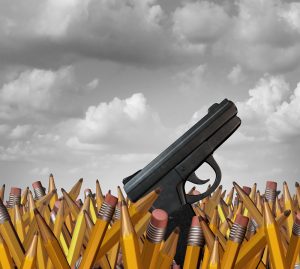School shootings are a parent’s and community’s worst nightmare. Unfortunately, the wave of these national tragedies continue to rise and answers are still yet to be found on how to stop the senseless killing of children and teachers in schools due to mentally unstable individuals with guns.
The facts are alarming. The “Sandy Hook Promise” organization lists a variety of horrific gun and children related facts. Overall, each day 8 children die from gun violence and are the leading cause of death for children and teens. Unfortunately, despite the alarming number of school shootings, many could be avoided. In 4 out of every 5 shootings, at least one person knew beforehand or could have prevented it through proper vigilance and acknowledgement of the warning signs. Many of the attackers showed signs in the weeks before the attack with as many as 75 percent of individuals noticing the alarming and threatening behaviors. Finally, 68 percent of the time, most of the firearms were taken from the home due to improper storage of the weapon or parents did not believe the child knew where the gun was stored.

This leads to two alarming trends. First mental health and second gun safety and laws. Better mental health care is required for youth as well as facilities to care for those exhibiting abuse, drug use as well as bullying. Secondly, better gun control laws without restricting freedoms need to be in place to protect children and schools. Yet, with political tug of war in Washington, little traction has been made, much less real solutions due to extremes that cannot reach common sense solutions.
The frightening reality is that shootings occur, children die and families deal with immense grief. Grief Counseling and trained grief counselors has risen due to these traumatic events. Families and victims need counseling from professional counselors, as well as certified grief counselors who can help with the local school district in helping teachers, staff, families and students with their grief and its processing.
In understanding a school shooting and its impact, it needs to be clearly classified as a traumatic event. PTSD is definitely a possible short term and long term lingering effect on many students and staff. This is especially made worst, since it was a human caused evil that baffles all logic and sense. Individuals are left with survival guilt, death imprint and imaging that is difficult to be associated into the mind due to the extreme graphic visuals.

In counseling, all of these issues will be difficult to address and many may seek avoidance but the incident will continue to haunt. Until the loss and trauma is discussed in a healthy way, then and only then can grief healing take place. Following this though is the grieving process itself which can lead to complicated grief itself and depression due to the horrific nature.
Parents losing children, classmates losing friends, teachers losing students and communities being scattered suffer both individual and collective grief at various levels. All parties need help in processing the loss and caring for each other in healing and preventing anyone from being left behind. Support groups, individual counseling and helping others adjust to life after such a horrific event are parts of dealing with the crisis and part of the process of grief counseling.
Memorials, remembrance, social action and community outreach can help some heal, but the scars will always remain visible and apparent. Sandy Hook is only one sad reminder of these events in recent American history and continue to haunt so many more.
As grief counselors, it is not the purpose necessarily to find answers because there are no true answers to complete evil and trauma. Instead, it is the purpose to help others overcome trauma and find some balance in life. To try to help the loss find a place in the narrative of a person’s life and where that person will go in the future. Such tragic grief and loss usually does not end well though and it should not because it is so horrific, evil and traumatic. Love has been uprooted and painful loss inserted. It is a life long practice to learn to cope with the loss that will forever haunt everyone involved in such needless chaos.
Learning to help those through such difficult events is a process for qualified professionals. Grief even traumatic grief is unique and every student or teacher will react and recover within their own paradigms. Some may be prone to PTSD, while others will deal with naturally grieving and process it. Others may be extremely guilty and have more vivid death imprints. Others will be traumatized more due to relationships that were deeper. This involves a long process of vetting, questions and determinations to see who is highest risk to PTSD and complicated grief reactions.
If you would like to learn more about Grief Counseling or would like to become a certified Grief Counselor then please review AIHCP’s Grief Counseling Certification and see if it meets your academic and professional goals. The program is online and independent study and open to qualified professionals seeking a four year certification in Grief Counseling.
